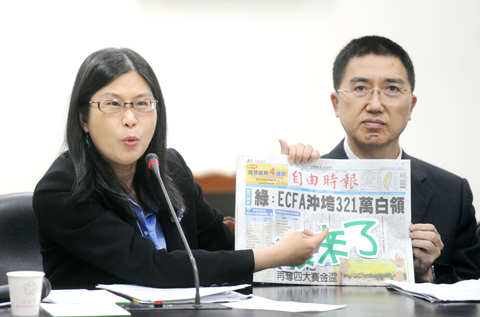|
Officials deny ECFA is a threat
BACKDOOR: The KMT denied DPP claims that revisions to
labor laws and a proposed ECFA would threaten the jobs of 3.21 million
professionals and white-collar workers
By Vincent Y. Chao and Shih Hsiu-chuan
STAFF REPORTERS
Wednesday, Apr 07, 2010, Page 1
“It is astonishing to say that [3.21 million] workers will be affected.”— Huang Chih-peng, director-general of the Bureau of Foreign Trade

Mainland Affairs Council Chairwoman Lai Shin-yuan,
left, points at an article in the Liberty Times that she claims contains errors,
as Chinese Nationalist Party (KMT) caucus secretary-general Lin Hung-chih looks
on.
PHOTO: LO PEI-DER, TAIPEI TIMES
Government officials yesterday rebutted opposition claims that a planned
economic cooperation framework agreement (ECFA) under negotiation with China
would threaten Taiwan's 3.21 million although they did not promise that
white-collar workers would be included in the list of restrictions in the deal.
A recent study by the DPP's policy research and coordinating committee estimated
that up to 3.2 million Taiwanese white-〝collar workers could be affected by an
influx of cheaper goods from China because of the ECFA and if Chinese workers
were allowed to apply for professional licenses in Taiwan.
The healthcare industry, which includes the traditional Chinese medicine sector,
would be among the most affected because of an influx of cheaper Chinese labor
impacting about 277,070 healthcare professionals, the study said.
The study says that "if Ma's administration continues to open up the Taiwanese
service sector and recognize Chinese educational certificates, the amount of
Chinese people coming to Taiwan and applying for professional certification will
greatly increase," because of factors including a common language and Taiwan's
higher wages.
These fears are expected to become a subject of debate in the legislature this
week as a revision to the Statute Governing the Relations Between the Peoples of
the Taiwan Area and Mainland Area (台灣地區與大陸地區人民關係條例) proposed by DPP lawmakers
aims to prohibit Chinese educational certification from being used in public
service, professional and other expert exams.
Dismissing the study, Bureau of Foreign Trade Director-General Huang Chih-peng
(黃志鵬) yesterday said: "It is astonishing to say that [3.21 million] workers will
be affected."
Huang reiterated the promise that an "ECFA would not alter the current
prohibition on Chinese workers," but admitted that the ban did not extend to
white-collar workers, meaning individuals holding professional licenses.
"We will stick with the current rules that prohibit [Chinese] attorneys,
accountants, architects and doctors from practicing in Taiwan," Huang said.
The Chinese have reportedly demanded that an ECFA include provisions that allow
an inflow of individuals who have obtained such professional licenses.
Huang said the matter was contingent on whether Taiwan changes its policies to
recognize Chinese diplomas and to allow Chinese citizens to take Taiwan's
national exams.
Saying that the changes would not negatively affect the local labor market as
they were aimed at facilitating short-term business travel by Chinese
businesspeople, Huang added that they were necessary after the government moved
to allow more Chinese investment.
In related developments, the DPP yesterday said a move by the government to
loosen work restrictions on high-level managerial staff from China will
drastically impact the nation's white collar workforce.
Two regulations revised last Friday by the Ministry of the Interior (MOI) will
allow Chinese professionals working for multinational corporations to increase
their duration of stay in Taiwan from one to three years.
The revisions also mean that more Chinese service industry professionals will be
allowed in the nation. Meanwhile under the new regulations, smaller companies
will also be able to send in more Chinese workers while the max annual threshold
for sponsored Chinese visits will be doubled.
The DPP expressed concerns that the proposals were a "backdoor" which could
undermine an earlier pledge made by President Ma Ying-jeou (馬英九) that Taiwan's
borders would remain closed to Chinese workers as part of an ECFA.
DPP Spokesperson Lin Yu-chang (林右昌) said that while it was unlikely that any
mention of the Chinese workers would appear on the final agreement text, the
government would try and use other methods of ensuring that Taiwan's borders
were opened such as the MOI revisions.
"It's becoming more and more clear to us that signing an ECFA will allow even
more Chinese industries to come to Taiwan and bring along their own workers.
This will have serious repercussions on Taiwan's labor market," Lin said.
DPP lawmakers yesterday also panned the move, saying the government needed to
place more stringent controls on visits by Chinese professionals to ensure they
do not displace Taiwanese jobs.
While officials from the Bureau of Foreign Trade acknowledged the regulations on
Chinese workers would be loosened, they stressed the government would continue
to bar workers from certain service professions from coming into the country.
"We will open up [our borders] a bit to the operators of [Chinese] investment
firms, high-level managerial staff and experts," said Huang. "But what we are
not doing is opening up so Chinese white-collar workers can come to Taiwan. Even
if they are here for investment, their numbers will be strictly controlled."
Despite the government assurances, some DPP lawmakers however are saying that
the relaxed regulations could mean that multinational corporations have less of
a need to hire Taiwanese workers.
According to figures provided by the DPP caucus, visits to Taiwan by Chinese
professionals have already doubled from 71,000 trips in 2008 to 155,000 in 2009.
DPP Legislator Tsai Huang-liang (蔡煌瑯) said the figures could further increase to
400,000 visits this year if an ECFA is signed.
|
![]()
![]()
![]()